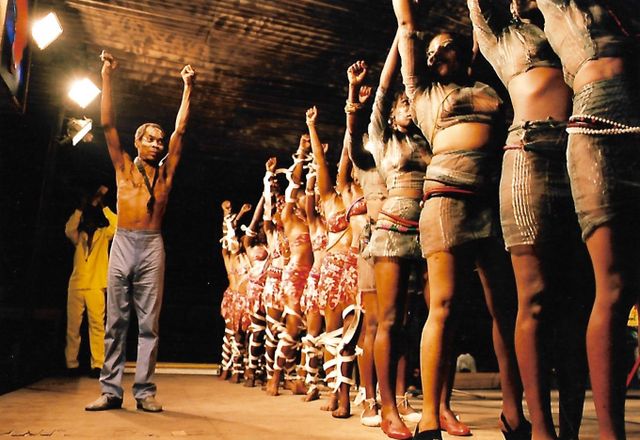Video installations
Fela Kuti and the Politics of Remembering, Artistic Shadow Libraries
Thu, Mar 21–Sun, Mar 24, 2019
6 pm – 12 midnight
2019, Fri, Mar 22 – Sun, Mar 24
2 pm – 12 midnight
Free admission

Fela Kuti and the Politics of Remembering
A project by Renata Di Leone and Armin Linke in collaboration with Giulia Bruno and Giuseppe Ielasi
Treasures from a private Italian archive: The Italian director Michele Avantario was a close friend of Fela Kuti and a resident of the Kalakuta Republic founded by Kuti. From the 1980s up to the end of the ‘90s, Avantario accompanied the Afrobeat icon with his camera, filmed and collected rare footage about his life, including rousing live shows in Africa and Europe, an exclusive interview with Kuti, intimate family photos and his 1997 funeral attended by hundreds of thousands. Today Avantario’s collection is the most comprehensive Fela Kuti archive in the world composed of films, photos and slides. These fragments about the last years from Fela Kuti’s life will be shown publicly for the first time. Filmmaker and photographer Armin Linke and Renata Di Leone, in cooperation with Giulia Bruno and Giuseppe Ielasi, reactivated and compiled the footage from Avantario’s estate. Intended as a suggested choice, encouragement to continue and to pay homage to all those who keep Fela Kuti’s legacy alive, the installation also reflects problems of appropriation and selection. How memory is narrated, framed and made accessible always implies questions of power, but in particular when it comes to the legacy of a man who was so influential on the African continent both musically and politically as much as Fela Anikulapo Kuti.
Artistic Shadow Libraries
Creating Commons (Cornelia Sollfrank, Felix Stalder, Shusha Niederberger)
Cornelia Sollfrank’s interview montage shows artists creating web archives as commons practice: the art wiki Monoskop, the no budget avant-garde archive UbuWeb, the online libraries Aaaaarg and memoryoftheworld.org and 0xdb.org, a database containing 15,000 films. By means of technical infrastructures, communities and mutual negotiation of terms of use, these “shadow libraries” provide access to cultural assets – unauthorized, free of charge, collaborative. In times of progressive containment, they thus make a both undogmatic and precarious contribution to accessing and collaboratively establishing cultural memory.
creatingcommons.zhdk.ch